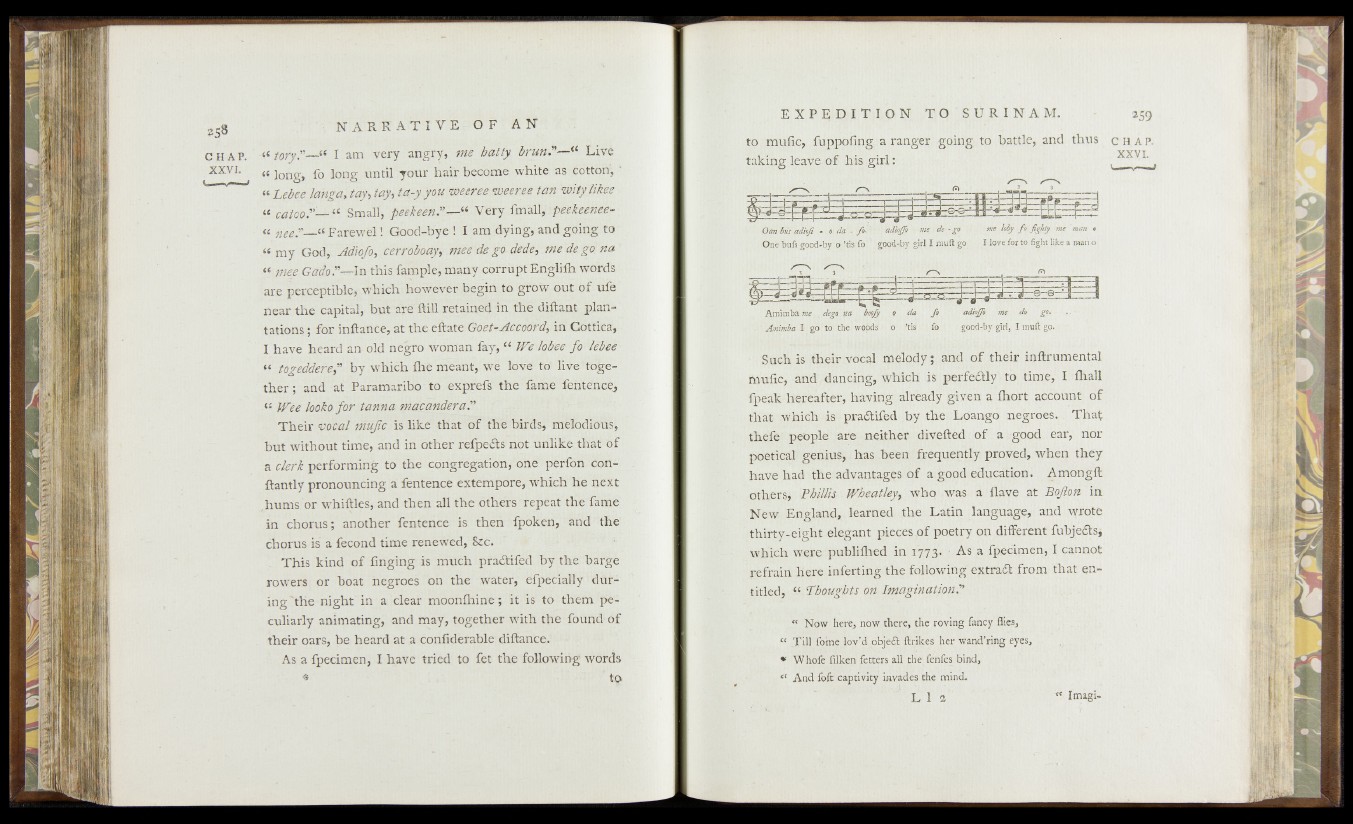
N A R R A T I V E OF AN 95»
c h a p . “ tory.”—(( I am very angry, me batty brun? — M Live
XXVI* w long, fo long until your hair become white as cotton, '
« Lebee tanga, tay> tay, ta-y you we,.er.ee weerei tan mtylikee
“ caîéS’^-“ Small, peèbeen?—Ci Yéry {mj&,'peekeenee~:
« neer— « farewel ! Good-bye ! I am dying, and going, to •
my God, Adiofo, cerrôboay, mee de go. dede, me'êe^mna
u mee Gado.”^ in this fample,many corrupt Engliih words
■ are perceptible, which however begin to growout o f ufe
near the capital, but are' ftill retained in the diftant plantations;
for inftance, at the efrateGô&ïAeboordi'iiè Gôttica,
1 have heard an-oid negro woman fay, “ We'JoUee:>fouettée
“ togeddere” by which fhe meant, wé love to* li$e*ft%e-
ther ; and at Paramaribo to exprefs the fame fehteïice,
« Wee loo kofortanna màeqnâera?
Their vocal niufic is like that of the birds,* rabïodioûs,
but without time, and in other refpedts not unlike th'atfhf
a clerk performing to the congregation, one perfbri- cbri-
ftantly pronouncing a fentence extempore, Which he next
, hums or whiffles, and then all the others repeat theTarae:
in chorus ; another fentence is then fpoken,' arid 'the
chorus is' a fécond time renewed, &c. I * * r *>
V This kind of finging is much pra&ifed by the barge
rowers or boat negroes on the water; efpecially f durin
g 'th e n ig h t in a clear moonfhine ; it is to them peculiarly
animating, and may, together with the found of
their oars, be heard at a cohfiderable diRance,.* 1
As a fpeeimen, I have tried to fet thé following words
* to
E X P E D I T I O N T O S U R I N A M. 959
to^mufic, fuppofing,:a ranger going , to battle, and thus crap.
taking leave of his girl : . XXV1,
M & S lÊ È IÈ ffl 3
m i è
k ra - 0 - 8 - 1 4 “^ - -
Qan bus adioji - 0 da - Jih - de -go me hby,fo fighty
1 One bufs good-by o ’tis fo ’ good-by girl £ inuft go.: l® love for to fight like a man o
Amirnba me -, dego na bwjÿ o da fo
yîmimba ij £*!} te! tee. woods’ . ’tis | fo
-- ------ -
adiojfo me do go.’
■ good-by girl, I mult go.
1 S u ^ is -their vocIgBmelody; and of their inftrumentai
ftiufe, add,dariting, which is perfedtlyito time, I Ihall
ipeak hereafter, having already gi^en a fhort account of
that which is« pratiifed^by the Loango negroes. That
thefe people are neither * divefted ;o f a . good ear^ nor
poetical'genius,.has,been frequently proved, when they
have had the-advantages of a.good-education. Amongft
others; Phillis- - Wheatleyy whq-was a ‘Have at BoJfo.n in
New England,, learned ,the Latin language, and wrote
thirty-eight elegant pieces,of poetry on different fubje^ts;
which were publifhed in 17:73. * As fpeeimen, I cannot
refrain here inferting the following extra# from that entitled,
“ thoughts on. Imagination ? i j
“ Now here, now, there, the roving fancy flies,
“ Till foing loydjobjeA'^lrikes 'he'r wand’ring eyes,
* Whofe filken fetters all the; fenfes bindi
1 And foft captivity invades the mind.
L I IS 1 Y" Bp I«*iagi
w t f i ” " * * - * *